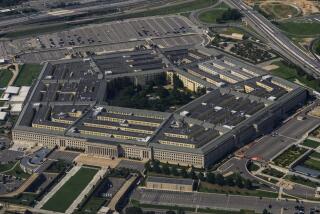Iraq to probe 4 slayings by U.S. troops
- Share via
BAGHDAD — Infuriated by the recent fatal shootings of four people by U.S. soldiers, Iraqi Prime Minister Nouri Maliki has decided to appoint a judge to hear evidence in the cases, a close aide said Sunday.
“There must be a hearing of some sort by an Iraqi judge,” said Haider Abadi, a lawmaker with Maliki’s Islamic Dawa Party and member of the prime minister’s inner circle.
The appointment of a judge to hear evidence against U.S. soldiers would represent a significant encroachment on the rules laid down during the U.S. occupation, which provide foreigners working in the country, both military and civilian contractors, immunity from the Iraqi judicial process.
Abadi acknowledged that the judge would have no authority to convict or sentence Americans, but he said a forum is needed to provide Iraqis a sense of justice.
“It’s not acceptable, Iraqis getting killed without even knowing if it is the result of a tragic incident or this is negligence on the part of the U.S. military,” he said.
Abadi said he had been told the U.S. military was willing to cooperate but said he was skeptical that it would produce investigative documents or allow soldiers to testify. The military did not respond Sunday to a Times query asking whether it would participate.
The Iraqi lawmaker described the proceeding as something like an American coroner’s inquest. It would allow all the evidence to be weighed in public by a judge who would decide whether there was criminal negligence.
He said he hoped the hearing would provide a way out of the impasse over immunity, which has tied up negotiations over extending the U.S. military’s authorization to stay in Iraq after its United Nations mandate expires at the end of the year.
Iraqi officials have been demanding legal jurisdiction to prosecute U.S. troops and contractors for their crimes. U.S. negotiators are willing to cede jurisdiction over contractors but not military personnel.
“The Iraqi side wants to have a procedure where at least the Iraqi judiciary is respected and facts are presented so that we can arrive at a conclusion,” Abadi said. “At the moment we never arrive at facts. There is an Iraqi story and an American story. We just forget about it.”
Maliki reached the decision after U.S. troops searching for a suspect in Karbala province on Friday fatally shot an 18-year-old guard who was a distant relative of the prime minister.
As often happens, there were differing accounts. The slain man’s brother said the soldiers took the victim into a house and shot him. The U.S. Army released a statement saying he came out of a building “brandishing an AK-47 held against his shoulder as if to fire.”
Ill feelings were further exacerbated when Karbala Gov. Aqeel Khazali accused the Americans of conducting the raid without obtaining his approval. Karbala is one of nine provinces where the U.S. has transferred responsibility for security to local authorities.
Despite all that, Abadi said Maliki was more disturbed by the killing Wednesday of a bank manager and two female employees on their way to work at Baghdad’s international airport.
The U.S. military described the three as criminals and said soldiers in a convoy fired on them only after being fired upon.
Abadi said he found that unbelievable. “That doesn’t fit with these people,” he said.
Abadi said he didn’t know when the judge would be appointed, “but the [prime minister] is keen about conducting it quickly.”
Also Sunday, the Iraqi government announced its intent to file suit in U.S. courts to recover funds allegedly embezzled from the United Nations oil-for-food program during Saddam Hussein’s rule.
A statement by government spokesman Ali Dabbagh said the lawsuits would target companies and individuals that conspired to corrupt the U.N. program.
Dabbagh did not name any companies or say how much the government hoped to gain by going to court, but his statement cited the findings of a 2005 U.N. inquiry into the program.
That investigation headed by former Federal Reserve Chairman Paul A. Volcker concluded that 2,400 companies and individuals participated in fraud that included $1.8 billion in kickbacks to Hussein.
After the inquiry, several of those named were prosecuted in the United States and Europe, resulting in prison sentences for two Texas oilmen and restitution totaling tens of millions of dollars from several companies.
But little has been done to recover larger sums from those named in the Volcker report in countries that include Russia, China, Yemen, Egypt, Vietnam, Malaysia and the United Arab Emirates.
The oil-for-food program was intended to allow humanitarian goods to reach Iraq while the country was under international sanctions after its invasion of Kuwait, which precipitated the 1991 Persian Gulf War.
--
Times staff writers Usama Redha and Raheem Salman and special correspondents in Karbala and Baghdad contributed to this report.
More to Read
Sign up for Essential California
The most important California stories and recommendations in your inbox every morning.
You may occasionally receive promotional content from the Los Angeles Times.











